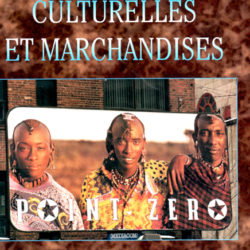
Frontières culturelles et marchandises.
Anthropologie et Sociétés – 1994 Volume 18 numéro 3
Jean Comaroff – The Empire’s Old Clothes. Fashioning the Colonial Subject
This essay explores the role of dress in the making of colonial subjects and « ethnic» communities. It asks why nineteenth-century British missions in Southern Africa, striving to re-form African hearts and minds, devoted so much time to clothing black bodies. Clothing, for the Christians, was the « fabric of civilization »; its appropriate consumption was seen as a major means of shaping new forms of selfhood, desire, and labor. While European dress (both new and second-hand) did effect transformations, it touched off a complex politics of dress, playing into the making of new ethnic and class identities, but also encouraging a novel cross-breeding with indigenous styles. If Africans remade their traditions with colonial materials, they often asserted local modes of appropriation, playing in unforseen ways on the possibilities of commodity culture.
Allison James – Cooking the Books: Global or Local Identities in Food Cultures?
Addressing the linkage between food and cultural identity, this article explores some of the
changes which have occured in patterns of food consumption in British society since the 1950’s. The increasing globalization of foodstuffs – through the importation of exotic, foreign foods and the expansion of fast-food franchises like McDonald’s – might be taken to suggest that food has lost its potency as a symbolic marker of identity. However, this article questions whether creolization is a necessary outcome of current trends. Focusing specifically on cookery books and popular writing about food in contemporary Britain, the author documents the different meanings which both exotic and domestic foods have taken on, and concludes with the question of whether recent developments reflect an abandonment of national, regional and class identities – traditionally refracted in and through the food domain – or, conversely, their rephrasing.
Constance Classen and David Howes – The Aroma of the Commodity
This essay traces how the relationship of North Americans to their bodies has come to be
mediated by various toiletry products (soap, deodorant, mouthwash) which promise to shield the consumer subject from social rejection by eliminating or suppressing unwanted body odours. The authors go on to describe the history and analyze the range of ideal olfactory identities currently available for adoption by the consumer subject through the purchase of perfumes or colognes. There follows a discussion of the growing use of scents to enhance the consumer appeal or « aura » of manufactured products. The article concludes with a brief examination of how a single, American-style regime of olfactory values is spreading around the world, but also shows how this regime is undergoing changes and has encountered resistance in various quarters.
Jean-Marc Philibert – Erakor or the Slow Consumption of an Imaginary Collective Capital
When the members of Third World societies consume objects/signs of Western provenance, they are compelled to absorb the ideas and intentions which figure in the production of these objects as well. The consumption of these objects/signs is therefore equivalent to the consumption of signs and ideas associated with industrial capitalism. Can the societies of the Third World resist such ideological penetration? Do they possess the means to neutralize the systems of ideas that imbue everything from clothing to telecommunications, including housing and health care systems? Must the end result be one of subjugation to consumerism and recolonization? In this paper, an analysis of consumer behaviour in rural and urban Vanuatu is offered which attempts to grapple with these questions by focusing on the relations between forms of consumption, identity construction, and ideological reproduction.
David Howes
Introduction. Worlds of Goods
Jean Comaroff
The Empire’s Old Clothes. Fashioning the Colonial Subject
Allison James
Cooking the Books. Global or Local Identities in Food Cultures?
Constance Classen and David Howes
The Aroma of the Commodity. The Commercialisation of Smell
Jean-Marc Philibert
Erakor or the Slow Consumption of an Imaginary Collective Capital
Brad Weiss
«The Food That’s Never Filling». A Social History of Haya Coffee (research note)
Carol Hendrickson
Selling Guatemala. Maya Export Products in Mail-Order Catalogs (research note)
Guy Lanoue
Mythification and Commodities in the Canadian North. The Televised Portrayal of Power (research note)
Christine Jourdan
Objects of Desire and Desire for Objects in the Salomon Islands (research note)
BOOK REVIEWS
Thomas W. Dunk, It’s a Working Man’s Town (Christopher McAll) 133
Rob Shields (dir.), Lifestyle Shopping (Val Morrison) 135
Joseph J. Tobin (dir.), Re-made in Japan (Michel Richard) 137
Jean Comaroff et John Comaroff (dir.), Modernity and its Malcontents (Jean-Claude Muller) 139
Christiane Gagnon, La recomposition des territoires (Paul Charest) 140
Christine Henry, Les îles où dansent les enfants défunts (Jean-Claude Muller) 142
Michael Houseman and Carlo Severi, Naven ou le donner à voix (Xavier Blaisel) 144
Jean Cuisenier, Le feu vivant (Yvan Simonis) 147
Stefan Seitz, Pygmées d’Afrique centrale (Paul Charest) 148
Jean Baudrillard, L’illusion de la fin ou la grève des événements (Xavier Blaisel) 149
Françoise Héritier, Les deux sœurs et leur mère (Yvan Simonis) 152

